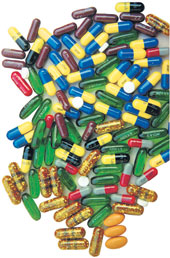 |
| BITTER pills: Overuse of antibiotics can be dangerous |
According to a study by the US organisation, Centre for Disease Control and Prevention, more than 50 million of the 150 million antibiotic prescriptions handed out to patients ? outside hospitals ? are unnecessary. As to the question why antibiotics are over-prescribed, there is a whole range of answers. Sometimes the patients demand an antibiotic for a quick recovery, at other times, it is a matter of diagnostic uncertainty. But have you ever wondered what the consequences of popping an antibiotic pill at your whim and fancy could be? The findings of the Consumer Education and Research Society, Ahmedabad, reveal that an overuse of antibiotics may be dangerous.
Side-effects
One of the most common side-effects of antibiotics is diarrhoea. If you develop diarrhoea after taking an antibiotic, you must get in touch with your doctor at the earliest. Nausea and fungal infections are also common. The more serious side-effects include the formation of kidney stones, abnormal blood clotting, increased sensitivity to the sun, blood disorder and deafness.
Some people are allergic to antibiotics, particularly penicillin, and can develop a rash, swelling of the face and tongue and breathing difficulty. Allergic reactions can sometimes be fatal. Make sure you consult your doctor before having an antibiotic if you have reduced liver or kidney function. Some antibiotics are even known to cause diabetes and cancer. Also, an extensive use of antibiotics among children has been linked with developmental problems like autism and speech difficulties.
Antibiotic resistance
The reasons behind developing antibiotic resistance are varied ? starting from an overuse of antibiotics, not completing a course of antibiotics to use of antibiotics on farm animals and crops, and extensive use of antibacterial cleaners.
When you are suffering from a viral infection, an antibiotic may reduce the duration of the symptoms by a day. But, at the same time, it makes you vulnerable to another infection that might, later on, resist antibiotic treatment.
Antibiotic resistance occurs when bacteria change in some way that reduces or eliminates the effectiveness of the drug. It usually occurs when an infection is not completely cured. In this case, some of the residual bacteria, having been exposed to but not killed by the antibiotic, ‘learn’ how to survive that particular antibiotic. This is why it is vital to complete a course of antibiotics.
Antibiotics stop working when bacteria either mutate ? enabling them to fight or inactivate the drug ? or acquire resistant genes from other bacteria, even of a different species. These surviving genes can multiply quickly, creating drug-resistant strains, says FDA Consumer, the magazine brought out by the US Food and Drug Administration (FDA).
Generally, the shorter the course, the fewer the chances of developing resistance. Also, using narrow-spectrum antibiotics is better because in case of broad-spectrum ones, not one but several types of bacteria can develop resistance.
Good bacteria
An estimated 500 to 1,000 different species of bacteria live in the human body. Most of them perform tasks that are essential for human survival and are known as good bacteria. According to Today’s Online Textbook of Bacteriology, the good bacteria help us in many ways. They prevent the colonisation of disease-causing microbes by competing for attachment sites or for essential nutrients.
But often, the use of powerful antibiotics in hospitals destroys the good bacteria and enables the harmful ones to infect patients.
Consequences
When antibiotics fail to work, the consequences can be serious. Apart from long-lasting illnesses, frequent visits to the doctor and extended hospital stays, you may also need more expensive and toxic medication. Some resistant infections can even cause death. Moreover, antibiotic-resistant bacteria can quickly infect family members, school mates and co-workers, threatening the entire community with a new strain of infectious disease that doesn’t easily respond to treatment. It is a matter of grave concern that the pace of development of new drugs has slowed down while the prevalence of resistance has grown at an alarming rate.
Tell your doctor
• Ask for a dosage that is of a short duration. In case of a longer course, the chances of the bacteria developing resistance are higher.
• Consult your doctor if you suffer from diarrhoea or any other side-effect.
• Tell you doctor if you are allergic to any antibiotic and inform him about any other medicine you are taking.
• Tell your doctor if you are pregnant or breast-feeding or have any other health problem.
• Certain antibiotics should not be taken with certain foods or drinks. Check with your doctor.
• Also check with him whether you should avoid alcohol while taking the antibiotic.
• If you feel the antibiotic is not working, inform your doctor. You may have a bug that is resistant to the antibiotic you are taking or you may not have a bacterial infection at all.
STATUTORY WARNING
• Use antibiotics only when they are likely to be beneficial. Do not urge your doctor to prescribe one.
• Do not take an antibiotic for viral infections like the common cold or flu.
• If you are taking antibiotics, make sure you complete the course even if you feel you have recovered.
• Do not self-medicate. Follow your doctor’s instructions strictly. Never take leftover antibiotics even if they were given earlier for a similar ailment, or antibiotics prescribed for someone else. They may not be suitable for your current symptoms.
• Some antibiotics can reduce the effectiveness of oral contraceptives. So take additional precautions.










